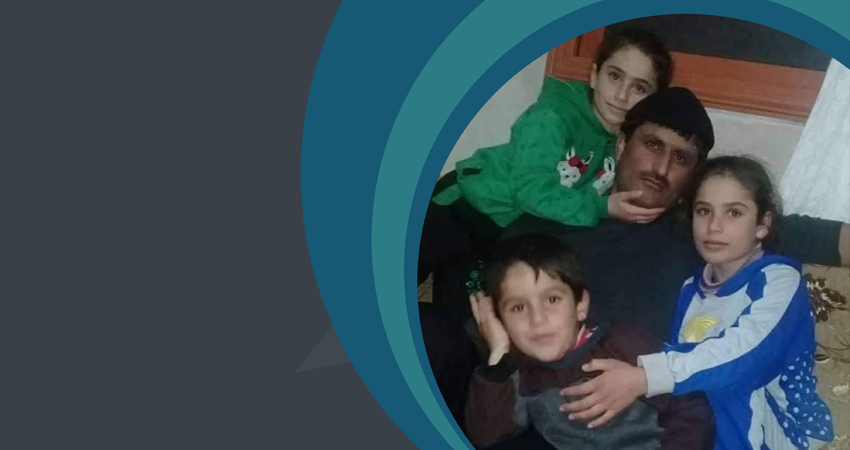Introduction:
On March 29, 2019, Mustafa Fattrawi was arrested by the Military Security Service in Homs city, a day which was to mark the beginning of five bitter years of captivity within the detention facilities of the Syrian security services. Accused of various charges, most notably “belonging to armed terrorist groups,” Fattrawi was transferred from one security branch to the other, going through hell at the Military Security Branch in Homs city, doomed to sustain tuberculosis at the Military Security Branch in Aleppo city. He was released in October 2018; but still, he is suffering to the date, for he left the detention facility with pulmonary fibrosis while he cannot undergo a surgery due to his poor financial status and the costs which he cannot afford. In December 2018, he recounted to STJ the following:
“You will get out of here to no other place but the grave!’ is one of the things engraved in my memory, which I repeatedly heard during my detention at the Military Security Branch in Homs city, where I have been exposed to massive physical and psychological torture, not to mention being hit with metal cables, subjected to electric shocks and being held in the Shabeh[1] position. I remember it to the day; the other detainees would lose conscious affected by torture. I never imagined that I will be out alive. It was a miracle.”
1. Who is the Survivor Mustafa Mohammad Fattrawi?
Mustafa Mohammad Fattrawi, 40 years old, was born in the city of Jarjanaz, southeastern rural Idlib. He is married and a father of three. Mustafa used to work at a quarry in Lebanon before his arrest in 2014. He was a man of a single interest—making a living and taking care of his wife and children. Mustafa remembers being happy back then, with his sole ambition and dream being the ability to start a small shop in his village, through which he is to provide for his family and himself. However, the arrest has brought his modest dreams into ruin and deprived him of his most basic rights into fatherhood. He said:
“They have deprived me of watching my little ones thrive and grow up; I have always contemplated taking care of my five years old boy with his siblings. But, the arrest denied me this. Even worse, when I was released my children did not recognize me, and this was the most painful moment of my life.”
In March 2014, while heading to his work in Lebanon, Mustafa was arrested by the Syrian security services. Going further into the incident’s details, he told STJ the following:
“I used to work for one of the stone quarries in Lebanon and visited my family every time I had the chance. On March 29, 2014, while on the way back from my town to Lebanon, particularly at the last check point of the Military Security Branch in Homs city, I was arrested by the personnel there. They asked for my identification document. A few moments later, I was informed that I am wanted. They led me to the Military Security Branch in Homs. There, I saw several detainees being beaten and dragged kicking and screaming like animals. I was then handed over to the jailor, with the rest of the detainees. The jailor started hitting us with thick cables. He also brutally beat us with a cane all over the body and deposited us in one of the prison cells. There, we were told to take off all our clothes, except for the underpants. After which the jailor resumed beating us till the morning. Inside, I was wondering, are there really humans who have reached such levels of savagery and baseness. We were next managed by a group called al-Sukhrah[2], which consists of long-time detainees. However, they were more merciful than the jailor. During this, I was not interrogated and had no idea of the charges I was accused of. They offered every three detainees one share of food, which was not enough, as it contained three olives, one boiled egg, half a loaf of moldy bread and a cup of boiled bulgur.”
2. Many Detainees would Return Unconscious:
Several days later, Mustafa was brought into the investigation room in the Military Security Branch in Homs city. All the way long, he was being severely beaten by the branch’s personnel, until they reached a room which was no more than two meters long and one meter wide. He was thrown into the room in the company of 12 other detainees, all standing on one leg. They were banned from siting down or sleeping while they waited for their turn for the interrogation. Commenting on this, he added:
“Each of the detainees would be interrogated for nearly four or five hours, and many of them would return having passed out of the severe torture. The al-Sukhra group would take them and thrust them into one of the extremely tiny water-filled cells, so they would not sleep. On my turn, I was taken to this room. There were three detectives and four militants in sport pajamas. They immediately started beating me with canes and metal cables. They then held me in the Shabeh position for hours. One of the detectives, for his part, started asking me if I am associated with the terrorist groups in any way. Every time I denied this accusation, they would torture and beat me further. I heard one of the detectives saying: ‘God willing, you will get out of this branch to the grave.’ One of the militants was sitting on a chair, drinking Mateh, near him there was a pot of boiling water, which he throw at me whenever he liked. I suffered thus for 36 days, getting summoned to the interrogation room, tortured and then returned to the cell.”
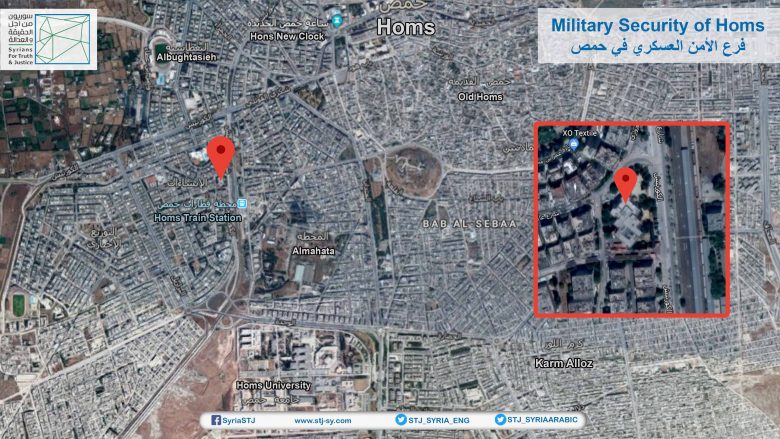
A satellite image showing the location of the Military Security Branch in Homs city.
In addition to the elderly and not yet 17 years old detainees he came by at the Military Security Branch in Homs city, during his detention, Mustafa was subjected to electric shocks two or three times a day while being interrogated. The militants at the branch would also shock his genitals making him scream at the top of his lungs.
“We were prohibited from talking or going to the toilet, so we had to pee in our pants. I do remember how they decidedly hit me in the face with boots, until I bled. This is in addition to the Bisat al-rih [3], a torture method which they subjected me to while beating me all over my body. I was detained at the Military Security Branch for about two months, and I was not transferred to the State Security Branch/General Intelligence Directorate in Homs until the marks of torture on my body started to gradually fade away. I was sent to the latter branch on July 10, 2014. There, we would be interrogated in a room with an area of no more than 6-4 meters, after placing us within a tire then turning us upside down, with our legs directed upwards. They would then start beating us with metal cables. Access to the toilets was not any better at this branch, for they would take a 100 detainees to the toilets, giving the whole lot fifteen minutes only. Those who needed to pee after 10 p.m. would be denied access to the toilets and would be forced into urinating in their place. Food, however, was nothing more than morsels of moldy bread.”
3. “He threatened to Cut off one of My Fingers if I do not Give Him a Name”:
Mustafa was held captive for 22 days at the State Security Branch, and then he was transferred once again to the Balloneh Prison in Homs, where he spent about 42 days and got subjected to torture and beating and was held in the Shabeh position in a solitary cell. Commenting on this, he said:
“I was not interrogated immediately upon arriving into the Balloneh prison. It was on the second day, when I was summoned to investigation. I was subjected to Shabeh from a door and kept thus to the end of the day. Then, one of the militants approached me and pointed to me to take the stairs with a number of other detainees. We went down, reaching the underground. There was a long corridor. One of the militants ordered us to take off all our clothes. We did, and we were all naked. He then opened the door to one of the solitary cells and pushed us into the room by kicking each of us in the back. I stayed there for ten days, until I was summoned for another interrogation. The detective at the time wanted me to confess the names of the terrorist gunmen and threatened to cut off one of my fingers if I did not provide him with names. Affected by the severe torture, I gave him names of a few dead people. To myself, I kept saying: ‘God deliver me from this pit of torture!’ I was, however, kept captive in that branch for over a month, where I put my fingerprint on three papers, the content of which I did not know as I was blindfolded. Next, they transferred me to the Military Police in Homs city, for later I knew that they have charged me with attacking one of the regime’s checkpoints in the Mount Zāwiya, firing 90 bullets and belonging to terrorist groups.”
Several months into his detention, Mustafa was moved into the Shaaereat Military Airport in Homs, accompanied by 56 other detainee. They were transferred aboard a fighter jet/helicopter, handcuffed and blindfolded, having no idea about their destination. They were then surprised that they have been taken to the Military Police in Aleppo city, as narrated by Mustafa:
“I prayed that the helicopter blows up, so as not to be transferred to another branch. I was totally exhausted back then. In the midnight, we arrived in the Military Police Branch in Aleppo city. The next day, I was shown before a judge, who asked for me by name. He started telling me about the charges I am accused of and counting my crimes, as if ‘I was the one behind the ruin of the Mount Zāwiya.’ When I denied all the charges, the judge told me that I would not be taken to other security branches and that my case is to be turned from military to a civil one. I was at ease somehow. And then, one of the militants came and returned me to the cell. After a while, I was again transferred to the Military Security Branch in Aleppo city, where I spent about ten months and developed tuberculosis with several other detainees. We were deposited at a hospital, for they feared its spread. When my health started to get better, I was transported to the Aleppo Central Prison, where psychological torture was continued. They used to offer us greenish water to drink, not to mention the rats that were to be found everywhere in the prison. The situation was thus, until the director of the prison announced that all those convicted with crimes of terrorism will be transferred to the al-Wihdah School in Aleppo city, which was turned into a detention facility. There, I stayed for a short time before I was sent to the School for the Deaf and Mute Persons, which was also turned by the regular forces into a detention facility.”
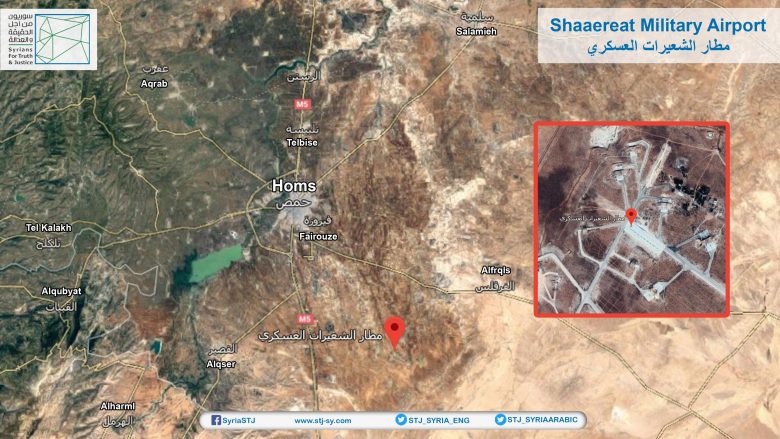
A satellite image showing the location of the Shaaereat Military Airport, to which the survivor detainee Mustafa Fattrawi was transported.
4. “My Body was already Exhausted by Tuberculosis at this Stage”:
For a year and a half Mustafa was detained at the School for Deaf and Mute Persons in the city of Aleppo, after which he was transferred to the Hama Central Prison, where he stayed for a while. Then, he was moved again to Homs, from where, he was taken to the Military Security Branch in Damascus city. At this stage, tuberculosis attacked him once more and extremely weakened his body. On this, he narrated the following:
“I was so sick at this stage, which necessitated that the militants transfer me to the Ibn Al-Nafees Hospital in Damascus city, where I underwent medical tests. Then I was confined in a solitary room, and they began to provide me with tuberculosis medications. I started to regain my health in about two months, but I was not allowed to enjoy this happiness for a long time, for they transported me to the Latakia Central Prison in the middle of the night, where I was beaten and tortured. They, then, brought me before a judge called Mazen Khankan, who informed me that I was accused of committing acts of terrorism, belonging to armed groups and possessing weapons in addition to several other charges. I spent about three years on trial until I was sentenced to 15 years of imprisonment. But praised be God, I was covered by a Presidential Pardon Decree, which was passed in 2018[4]. My sentence was commuted to five years of imprisonment with paying a fine of 280,000 Syrian pounds. I was released on October 20, 2018.”
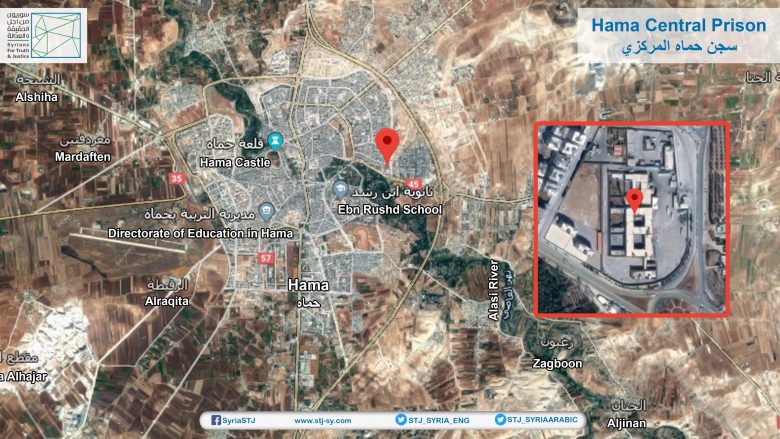
A satellite image showing the location of the Hama Central Prison, where survivor detainee Mustafa Fattrawai was held captive for a while.
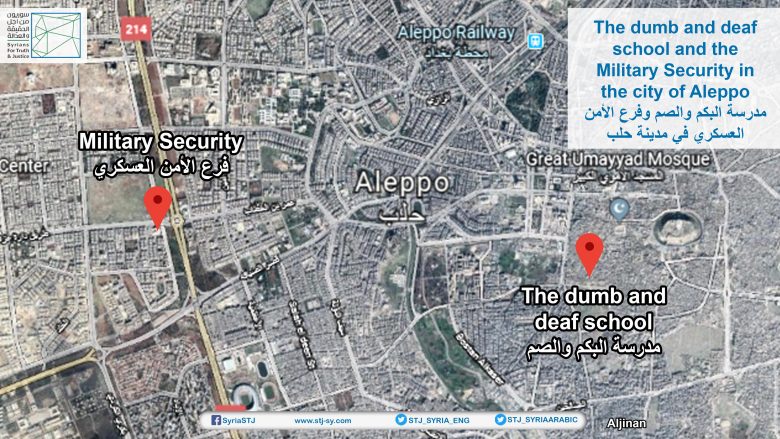
A satellite image showing the different detention facilities, where the survivor detainee Mustafa Fattrawai was imprisoned in the city of Aleppo (the School for Deaf and Mute Persons, Aleppo Central Prison, Military Security Branch in Aleppo city).
Mustafa was released, but his joy was not complete for he was discharged while suffering from pulmonary fibroses in his right lung, which resulted from the severe beating he was subjected to. Today, Mustafa is in need for a surgery, which he cannot undertake due to his poor financial status. Mustafa, however, still hopes for a change, a day when he would be able to enter the operation room. He concluded the account by saying:
“I never expected to come out alive from the branches of the Syrian security services; it was almost a miracle.”
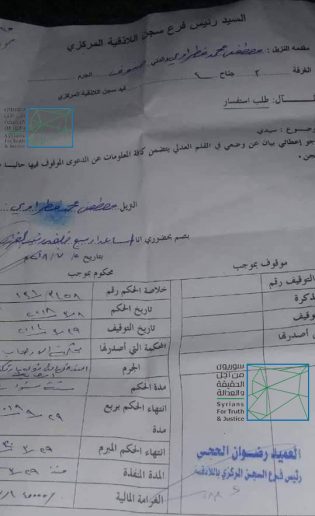
“Status Statement” granted by the administration of the Latakia Central Prison to the survivor detainee Mustafa al-Fattrawi. Phot credit: STJ.
[1] The victim is hung by manacled wrists, or from a hook or over a door, or occasionally by the feet, often for long periods and usually beaten; sometimes in a stress position where the detainee must keep his toes on the floor, as defined by Amnesty in its publication called: ‘I wanted to die’: Syria’s torture survivors speak out. First published in 2012. For further information refer to: https://www.amnesty.nl/content/uploads/2016/12/2012_03_13_syria_-_torture_report_final_with_pictures.pdf?x45368.
[2] People coerced into forced labor.
[3] Bisat al-rih (flying carpet) is a torture method whereby the victim is strapped face up onto a foldable wooden board, the two ends of which can be moved towards each other bringing the head towards the feet and causing significant pain to the lower back, during the process of which the victim is beaten, as defined by Amnesty in its publication called: ‘I wanted to die’: Syria’s torture survivors speak out. First published in 2012. For further information refer to: https://www.amnesty.nl/content/uploads/2016/12/2012_03_13_syria_-_torture_report_final_with_pictures.pdf?x45368.
[4] The Legislative Decree No. 18 of 2018 provided for granting a general amnesty for the offences committed prior to October 9, 2018, according to the following:
Article (1):
- Revoking the penalty imposed on perpetrators of the offences of domestic flight provided for in Article 100 of the Military Penal Code, promulgated by Legislative Decree No. 61 of 1950 and its amendments.
- Revoking the penalty imposed on perpetrators of the offences of external flight provided for in Article 101 of the Military Penal Code, promulgated by Legislative Decree No. 61 of 1950 and its amendments.
- The rulings of this article involve not offenders in hiding places and fugitives from justice unless they turn themselves in within four months in the case of domestic flight and over six months in the case of external flight as from the date of this Legislative Decree’s issuance.
Article (2):
- Revoking the penalty imposed on offences provided for in the Military Service Code No. 30 of 2007 and its amendments.
- The rulings of this article include not the penalty which sustain an aspect of civil indemnity meant for the state.
For further information, refer to the Legislative Decree No. 18 of 2018 providing for granting a general amnesty for the perpetrators of domestic and external flight offences prior to 9-10-2018. Syrian Arab Republic – Prime Ministry Website, October 9, 2018. Last visited: November 3, 2019. http://www.pministry.gov.sy/contents/14048/%D8%A7%D9%84%D9%85%D8%B1%D8%B3%D9%88%D9%85-%D8%A7%D9%84%D8%AA%D8%B4%D8%B1%D9%8A%D8%B9%D9%8A-/18/-%D9%84%D8%B9%D8%A7%D9%85-2018-%D8%A7%D9%84%D9%82%D8%A7%D8%B6%D9%8A-%D8%A8%D9%85%D9%86%D8%AD-%D8%B9%D9%81%D9%88-%D8%B9%D8%A7%D9%85-%D8%B9%D9%86-%D9%83%D8%A7%D9%85%D9%84-%D8%A7%D9%84%D8%B9%D9%82%D9%88%D8%A8%D8%A9-%D9%84%D9%85%D8%B1%D8%AA%D9%83%D8%A8%D9%8A-%D8%AC%D8%B1%D8%A7%D8%A6%D9%85-%D8%A7%D9%84%D9%81%D8%B1%D8%A7%D8%B1-%D8%A7%D9%84%D8%AF%D8%A7%D8%AE%D9%84%D9%8A-%D9%88%D8%A7%D9%84%D8%AE%D8%A7%D8%B1%D8%AC%D9%8A-%D8%A7%D9%84%D9%85%D8%B1%D8%AA%D9%83%D8%A8%D8%A9-%D9%82%D8%A8%D9%84-%D8%AA%D8%A7%D8%B1%D9%8A%D8%AE-9-10-2018?fbclid=IwAR3nDOP1JNjf_hHkOy2af0AEEsMa9q74SX7CE1Yhn9PSHhgSGI9nCsv8cj8.

